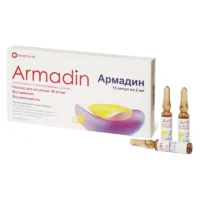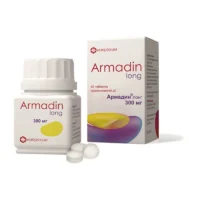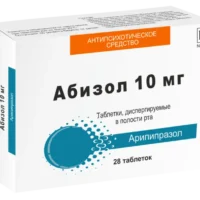Description
Avertid (Betahistine) Oral Solution 8 mg/ml – 60 ml – №1
Composition:
Each milliliter contains 8 mg of Betahistine dihydrochloride as the active ingredient.
Mechanism of Action:
Betahistine acts as a histamine analog, acting as a weak agonist at the H1 receptor and a strong antagonist at the H3 receptor. This dual action leads to increased blood flow in the inner ear, aiding in the alleviation of vertigo and balance disorders.
Pharmacological Properties:
The pharmacological properties of Betahistine involve its action as a histamine analog, resulting in improved blood flow in the inner ear, thereby reducing vertigo symptoms and restoring balance.
Indications for Use:
Avertid is indicated for the treatment of Meniere’s disease and vertigo. It functions by enhancing blood circulation in the inner ear and decreasing the pressure of the endolymphatic fluid.
Contraindications:
Do not use Avertid if you have a known allergy to Betahistine or any other components of the solution. It is contraindicated during pregnancy and lactation.
Side Effects:
Common side effects of Avertid may include headaches, nausea, and gastrointestinal disturbances. In case of severe adverse reactions, seek immediate medical attention.
Usage Instructions:
Prior to each use, ensure to shake the bottle thoroughly. Administer the prescribed dosage orally using the provided dropper. Avertid can be taken with or without food as directed by your healthcare provider.
Benefits Compared to Analogues:
Avertid has shown efficacy in reducing vertigo attacks in patients with Meniere’s disease. Clinical studies have demonstrated its effectiveness in improving vertigo symptoms and enhancing patient outcomes.
Suitable Patient Groups:
Avertid is suitable for adult patients with Meniere’s disease and vertigo. Dosage adjustments may be necessary for specific patient populations, such as the elderly, based on individual health conditions.
Storage and Shelf Life:
Store Avertid at the recommended temperature as specified on the packaging. Ensure proper storage conditions to maintain the product’s stability and potency. Check the expiration date before use.
Packaging Description:
Avertid is available in a 60 ml bottle with a concentration of 8 mg/ml of Betahistine dihydrochloride. Each bottle is labeled with the necessary dosage information and usage instructions.
Clinical Evidence and Effectiveness:
Clinical studies have demonstrated the efficacy of Betahistine in reducing the frequency and severity of vertigo attacks in patients with Meniere’s disease. Research findings published in reputable journals have shown significant improvements in vertigo symptoms with Betahistine treatment.





